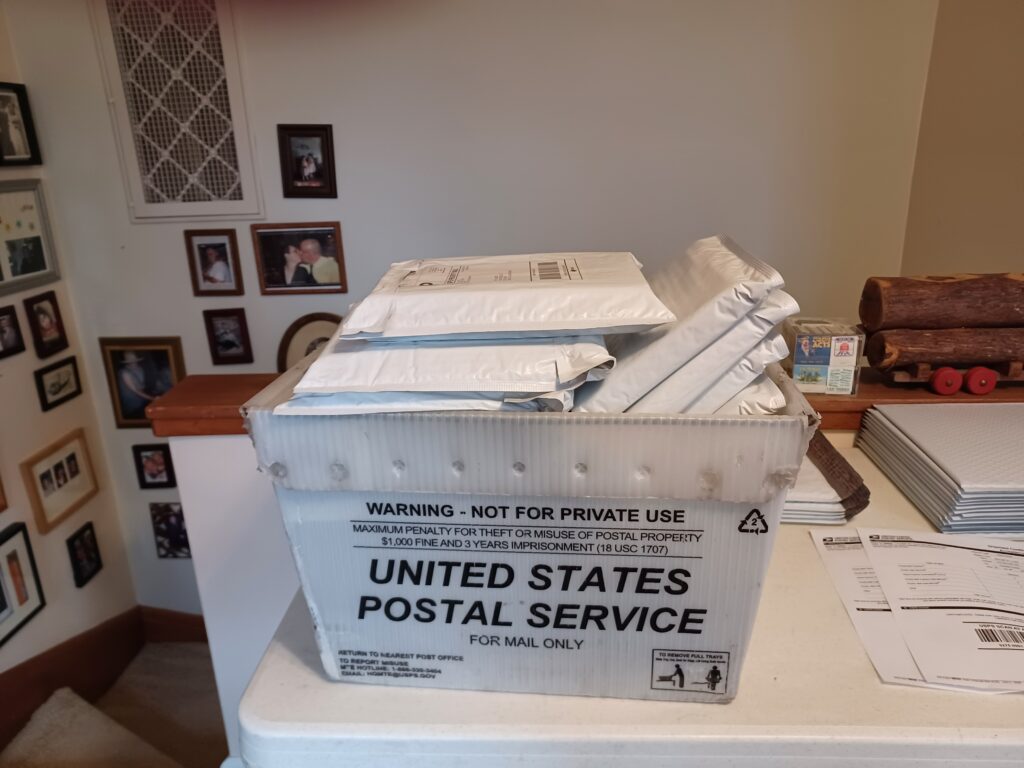Devotion and Corrosion is now out.
I had this cunning master plan. I was going to set everything up beforehand for Devotion and Corrosion’s release, so that on release day I wouldn’t have to run around like a maniac and hit buttons. Back in March I got Ingram ready so I could fulfill the Kickstarter, and planned to set up the other stores the next day. Instead, I chose to catch covid. (Zero stars, do not recommend.) It put me far enough behind that I completely forgot about releasing the book. Yesterday, I realized that Ingram had released the print book as scheduled. Oops! I ran around like a maniac hitting buttons.
I’m proud of this one. It’s some of my best work of the last decade, distilled into a single volume. ZZ Claybourne‘s delightful introduction does a better job of describing the book than I ever could. I want to declare “I defy anyone to read this foreword and not rush out to buy the book,” but y’all are a bunch of perverse buggers. You would devour the foreword, feel lust overwhelming for the book, and grit your teeth through the pain of denied need, all for the pleasure of proving me wrong.
Anyway, here’s ZZ. And check out the book. It contains a Lovecraftian tween, a brain implant, evil paint, the risk of destroying the universe, spite, and–of course–Sufficient Rat.
Foreword Motion
ZZ Claybourne
“I have love in me the likes of which you can scarcely imagine and rage the likes of which you would not believe. If I cannot satisfy the one, I will indulge the other.” From the Kenneth Branaugh movie adaptation of Mary Shelley’s Frankenstein
The insidious thing about love is we define it to suit us. There are people who think they’re so logical that no variety of something so basic as love sways them. A simple whisper or well-placed compliment flips their world. Artists will bring all their craft and time to bear on a project, then, for love of craft, never release it for fear it’s not good enough.
Would most of us do anything for love? In the same way there’s the erroneous envisioning of hope as some soft cloud of dreams, love is too often cast as a diaphanous thing ladling orgasms and picnics upon the world. Love is a Depression-era photo of a mother who’d snap the neck of God to make sure her children survive. Fortunately, humans come into the world slippery, hard to grasp, and weird, and generally stay that way. We’re all children or parents.
Invoking Shelley’s creature requires an understanding of the human condition. Invoking Ozzie Osborne requires honestly declaring how love eventually makes hypocrites of we angels. We may think we wouldn’t do that for love, but then find ourselves doing it twice. Granted, maybe not the way we think “that” would play out. Maybe we wouldn’t put Bambi on train tracks for love, but we can see ourselves laying a haymaker on a doe if it got too close to a baby. We can see ourselves testifying against our addicted twin if it meant they’d be remanded to medical care. Sacrifice is love. Self-preservation is love. Construction is love. Destruction is love. Truth is love. Lies are love. We’ll burn a hole through the Earth for love of profit. We’ll plant a million trees for love of forests. Devotion. Corrosion.
Shakespeare and balladeers never told us love was the stark Coin Flip of motivations.
When I was a teenager, my suicidal brother went missing during the worst of a Michigan winter. He was a few years older than me. I’d never really liked him, could’ve hated him. He was mean, selfish, and had a putdown for anything anybody held up as an accomplishment. I didn’t know anything about depression then, but I knew his mind. I knew the note he’d left wasn’t for show. So I wrapped my feet in bags, slid them into my threadbare boots, and walked alleys hoping to find him. Not alive. Just hoping to find him. I got home nearly frostbitten. Never found him.
I loved my brother.
Love drills nails into our lobes if we hand it the right power tools.
As an adult, love had me comforting the guy whom the woman I loved cheated on me with, the revelation coming when I knocked on her apartment door and he answered wearing my bathrobe. Weeks later, at 3AM, she called me. Except it was him from her landline. Wondering why she didn’t really love him.
That was an hour conversation.
I’d do it again.
There are so few times in life when we’re not touched by a bit of this glorious insanity. Smart people might postulate glorious insanity as the only thing sticking humanity together; I’m willing to give them that. We might not have had Toni Morrison, Prince, Alice Coltrane, or Johnny Cash otherwise. Wondrous love for a billion lights in the sky drives us to be creative. Creativity drives us to be compassionate. This is why my only mantra is Despite everything, create. Love demands we build, that we bring healing into lives that forever reach for succor like a confused infant in the eye of a storm.
A line I wrote a long time ago: ‘We’re all the ones who know so little, and I’m the one you least need fear.’ Folks reading this foreword know fear is the mind killer. Even when there’s every reason to fear, love factors into everything. My latest books are love letters to perseverance, community, and every mysterious grace that keeps life interesting. The Brothers Jetstream: Leviathan is love for adventure. Afro Puffs Are the Antennae of the Universe? Love’s in every word of the title.
Sometimes love forces us to create in order to destroy. Devotion and corrosion.
Devotion and Corrosion, the collection: Each story is Hieronymus Bosch writing a love letter to Charlie Brown’s little red-haired girl now grown and so weary she aches. Can you grasp that? Can you grasp an Elmore Leonard Hallmark romance? Or H.P. Lovecraft exorcising his demons as a kid out of love for himself before they calcify his adult heart? Rat familial love amasses in the thousands, and always with ready teeth. What Lucas has done is present the xenomorph from ALIEN going in for a French kiss: burning things to the bone so that the unspoken underpinnings show through. It’d be one thing if our species remained simply insane, but there’s that “glorious” part. That glorious devotion. Love, per Chuck Tingle, is real. Love is also a product of the imagination. We feel what we believe.
The 11 surprising, inventively immersive stories in Devotion & Corrosion know you know that fact. They share a fierce belief at their core, a belief that love can make things—if not right—better. Love will find a way to dig through us to the other, safer side. During times of insane politicians, alternative facts, and people considering putting ultraviolet lights up their butts, that belief might be the only type of love that moves us through our days. Because any time lying, pride in ignorance, or putrescent bigotry feel like love to some? We can do better than that.
We are better than that.
We know love. Somehow, we do.
Otherwise all is corrosion.







